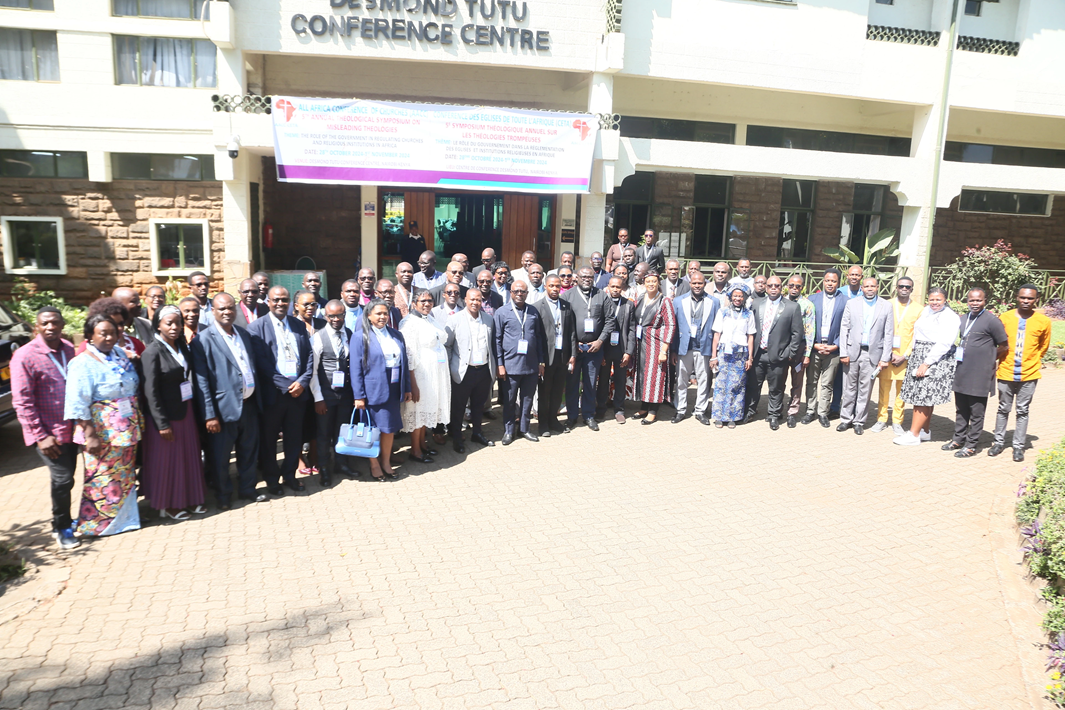NAIROBI, NOVEMBER 5, 2024 (CISA) – In a significant step toward addressing the intersection of Church autonomy and state oversight, the All Africa Conference of Churches (AACC) inaugurated its 5th Annual Theological Symposium on October 29.
Running through to November 1, 2024 at the Desmond Tutu Conference Center in Nairobi, Kenya, the symposium brought together 85 participants, including theologians, church leaders, and representatives from government and various sectors. The primary focus of the meeting was on the increasing need for government regulation of religious institutions in light of the spread of misleading theologies and harmful religious practices across the continent.
The symposium’s objective was to examine and discuss the delicate balance between protecting religious freedoms and ensuring public safety. Over three days, participants engaged in a series of presentations and panel discussions aimed at exploring whether, and to what extent, governments should regulate religious institutions.
Fr Dr John Ngige Njoroge, Executive Secretary for Theology and Interfaith Relations, in his opening remarks, underscored the pressing nature of these discussions, stating, “We need to find answers to critical questions around regulation- especially in light of the recent tragedies linked to unchecked religious teachings.”
The need for such conversations is underscored by a series of incidents across Africa, where misleading religious practices have led to tragic outcomes. The Shakahola massacre in Kenya, where hundreds died, is one such example, raising concerns over the lack of oversight. Similarly, cases in Rwanda and Zambia have shown how religious exploitation can result in harm, loss of property, and even fatalities. These incidents have highlighted the urgency of examining how state regulations can safeguard the well-being of congregants without infringing on religious liberties.
In his keynote address, Rev Dr Fidon Mwombeki, General Secretary of the AACC, emphasized the importance of a constructive relationship between church and state.
“Religion is an integral part of life, culture, and society,” Mwombeki noted, adding “It’s impossible for it to exist outside the government’s regulatory framework. At the same time, it is essential that this framework protects both believers and non-believers, ensuring harmony and order within society.”
His remarks set the tone for the event, as participants explored ways to balance church autonomy with public safety.
Throughout the symposium, participants examined various models and approaches to regulation. Notably, Namibia’s self-regulation framework for religious institutions was discussed as a possible alternative to direct government intervention. Many argued that a partnership between church and state could be a viable solution, where the church self-regulates but remains accountable to legal and social standards set by the state.
This approach was supported by Rev. Julie Kandema, Vice President of the Presbyterian Church in Rwanda, who argued, “The government and church are distinct bodies, yet they share a responsibility to protect the people. Working together can create a protective yet respectful environment.”
Several key questions framed the symposium’s discussions. Participants debated the role of government in regulating churches, what specific aspects of religious activities might warrant oversight, and how potential conflicts between state and church could be managed. The goal was not to undermine the autonomy of religious institutions but to protect individuals from exploitative practices that compromise human dignity and safety.
Rev Mwombeki also praised the participation of AACC’s member churches, including the Baptist Church of Nigeria, which sponsored many of the delegates. The commitment shown by these churches, he said, was “vital to advancing meaningful change.” He also took the opportunity to celebrate the success of the first cohort of the Master of Theology in Ecumenical Studies at Mindolo, Zambia, which aims to develop future leaders prepared to address complex theological and social challenges.
“The Master’s program in Mindolo is a powerful investment in the ecumenical movement’s future,” Mwombeki said, underscoring AACC’s dedication to nurturing leaders who are equipped to foster positive societal transformations.
As the symposium concluded, there was a collective call for collaboration between the church and state, recognizing that both entities play essential roles in safeguarding citizens. Participants advocated for a symbiotic relationship in which neither entity would dominate but rather work collaboratively to protect the people’s welfare and religious freedoms. The symposium provided a foundation for continued engagement on these issues, with plans already underway for next year’s event, which will focus on implementing the symposium’s recommendations.
The AACC has a rich history of addressing critical issues within the African Christian community. Established in 1963 at its first General Assembly in Kampala, Uganda, the AACC was born out of a desire for unity among African Christians, who were divided by denominational lines due to missionary history. The organization has since grown into a robust ecumenical body that seeks to foster cooperation among churches across the continent, focusing on theology, mission, interfaith relations, and ecumenical growth.
Through initiatives such as this symposium, the AACC is fulfilling its mandate to provide a platform for addressing pressing theological and social issues. Since 2019, the AACC’s Theology and Interfaith Relations unit has held annual theological symposia, addressing topics such as wealth and prosperity doctrines, theologies of health and healing, and power dynamics within churches. This year’s theme on government regulation of religious institutions highlights the organization’s commitment to safeguarding both the spiritual and social dimensions of African communities.
